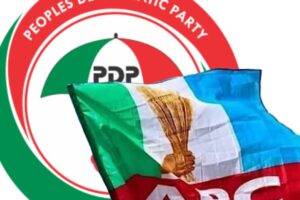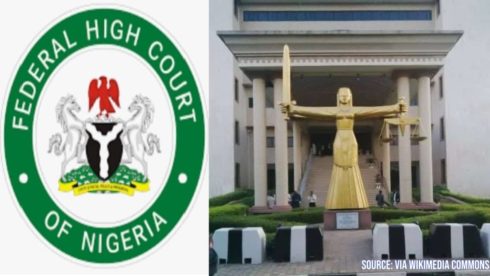On October 30, 2024, Justice Joyce Abdulmalik of the Federal High Court in Abuja issued a restraining order against the Central Bank of Nigeria (CBN), halting the release of monthly financial allocations to Rivers State. The court order stems from a legal dispute concerning the utilization and distribution of public funds allocated to the state. According to the court ruling, the CBN must refrain from disbursing any funds to Rivers State pending further legal review of the financial management and alleged irregularities surrounding the state’s revenue allocation.
The decision by Justice Abdulmalik comes amid heightened concerns over financial transparency in Rivers State. The ruling marks a significant development in the ongoing legal battle between various governmental and financial institutions within Nigeria. As the case progresses, stakeholders anticipate a comprehensive review of the state’s financial practices, which could set a precedent for other states facing similar allegations of misappropriation or financial mismanagement.
Legal Grounds Behind Federal High Court’s Decision on Rivers State Allocations
Justice Abdulmalik’s ruling underscores serious concerns regarding the legality of financial practices in Rivers State. The Federal High Court cited alleged violations of established financial protocols, suggesting that funds allocated to Rivers State might not have been appropriately managed according to federal regulations. This decision reflects the Federal High Court’s commitment to enforcing financial transparency and accountability in the allocation of public resources, ensuring that funds are used solely for the welfare of the state’s citizens.
Legal experts argue that this ruling could serve as a benchmark for other states, prompting a wave of scrutiny on how regional governments manage their federal allocations. Analysts believe the case has the potential to unveil systematic challenges in Nigeria’s resource distribution policies. Furthermore, Federal High Court’s intervention suggests that stricter checks and balances might soon be implemented to prevent misuse of public funds.
Central Bank Ordered to Freeze Disbursements to Rivers State
In compliance with Federal High Court order, the Central Bank of Nigeria has been directed to immediately halt any further disbursements to the Rivers State Government. This decision places the CBN in a pivotal position within the legal conflict, as the institution must balance court directives with its role in the financial management of state funds. The CBN’s cooperation is seen as crucial for upholding judicial authority and ensuring that funds are withheld until the legal proceedings are concluded.
The CBN’s action may affect essential projects and salaries funded by state allocations. With the halt in funding, there are concerns about potential disruptions to public services in Rivers State. The situation has already drawn reactions from state officials, who argue that the freezing of funds might impact ongoing projects and the economic well-being of citizens.
Implications for Rivers State Government Amid Financial Restrictions
Rivers State officials have voiced concerns about the potential impact of Federal High Court ruling on public projects and services. Government representatives argue that the withholding of funds could lead to significant delays in the completion of essential infrastructure projects, including road construction, education, and healthcare facilities. They contend that financial allocation from the federal government is a fundamental right of every state, critical to sustaining regional development.
Amid these challenges, the Rivers State Government is preparing to contest Federal High Court order, arguing that withholding funds harms citizens more than it does state officials. However, legal experts maintain that any misuse of allocated funds must be thoroughly investigated, and corrective measures implemented. Rivers State’s legal team is expected to submit a motion seeking a revision of the decision, emphasizing the need for a balanced approach that upholds both judicial authority and citizens’ welfare.
National Reactions: Court Ruling Sparks Public Debate on Fiscal Accountability
The Federal High Court’s decision has triggered widespread discussions on the importance of fiscal accountability across Nigeria. Citizens, civil society groups, and financial analysts have expressed mixed opinions, with some commending Federal High Court’s proactive stance against potential financial mismanagement. Supporters of the ruling argue that it highlights the need for transparency in public office, underscoring that public funds must be handled with the utmost integrity and accountability.
Conversely, critics are concerned about the implications for public welfare, questioning if the freeze on funds is a practical solution. Some argue that the ruling penalizes ordinary citizens rather than government officials, potentially impacting public services and development projects in Rivers State. This ruling has intensified calls for reforms in Nigeria’s financial regulatory framework to ensure accountability while safeguarding public services.
Future of State Allocations: Could This Ruling Set a Precedent?
The outcome of this legal dispute could have far-reaching consequences for other states and federal financial practices in Nigeria. If Federal High Court ruling against Rivers State is upheld, other states might also face increased scrutiny regarding their financial management practices. Legal and financial experts believe that this case could prompt policy reforms, leading to more stringent monitoring and enforcement of state allocations by federal bodies such as the CBN.
The future of inter-governmental relations may also be shaped by this case, as the federal government may look into developing more effective oversight mechanisms for state allocations. Financial experts argue that the ruling could be a catalyst for a nationwide reassessment of how states are funded and held accountable, setting a new standard for transparency and integrity in the management of Nigeria’s public resources.
Table of Contents
Discover more from OGM News NG
Subscribe to get the latest posts sent to your email.














